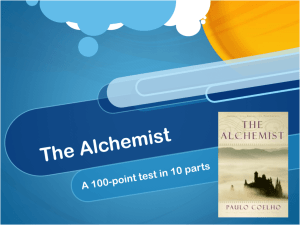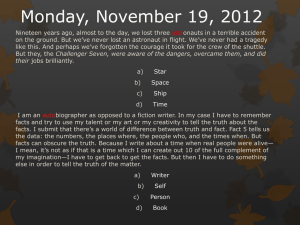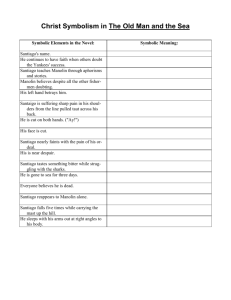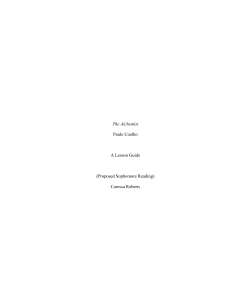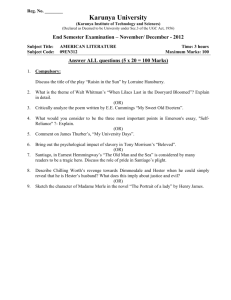File - Ms. Meyer's English Website
advertisement
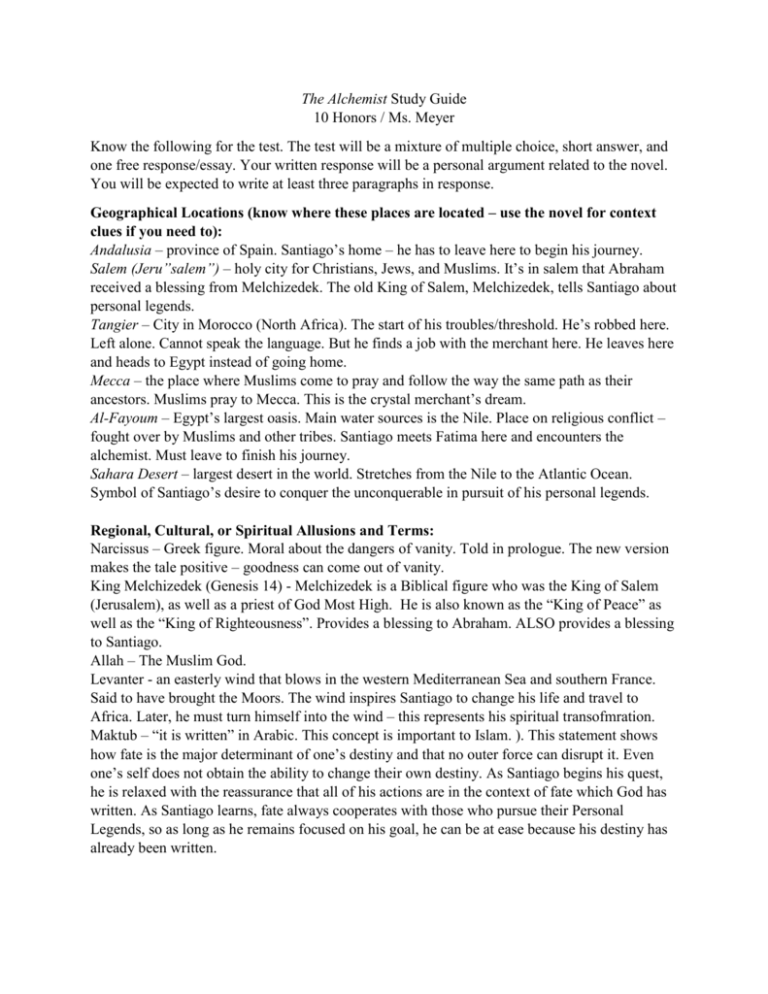
The Alchemist Study Guide 10 Honors / Ms. Meyer Know the following for the test. The test will be a mixture of multiple choice, short answer, and one free response/essay. Your written response will be a personal argument related to the novel. You will be expected to write at least three paragraphs in response. Geographical Locations (know where these places are located – use the novel for context clues if you need to): Andalusia – province of Spain. Santiago’s home – he has to leave here to begin his journey. Salem (Jeru”salem”) – holy city for Christians, Jews, and Muslims. It’s in salem that Abraham received a blessing from Melchizedek. The old King of Salem, Melchizedek, tells Santiago about personal legends. Tangier – City in Morocco (North Africa). The start of his troubles/threshold. He’s robbed here. Left alone. Cannot speak the language. But he finds a job with the merchant here. He leaves here and heads to Egypt instead of going home. Mecca – the place where Muslims come to pray and follow the way the same path as their ancestors. Muslims pray to Mecca. This is the crystal merchant’s dream. Al-Fayoum – Egypt’s largest oasis. Main water sources is the Nile. Place on religious conflict – fought over by Muslims and other tribes. Santiago meets Fatima here and encounters the alchemist. Must leave to finish his journey. Sahara Desert – largest desert in the world. Stretches from the Nile to the Atlantic Ocean. Symbol of Santiago’s desire to conquer the unconquerable in pursuit of his personal legends. Regional, Cultural, or Spiritual Allusions and Terms: Narcissus – Greek figure. Moral about the dangers of vanity. Told in prologue. The new version makes the tale positive – goodness can come out of vanity. King Melchizedek (Genesis 14) - Melchizedek is a Biblical figure who was the King of Salem (Jerusalem), as well as a priest of God Most High. He is also known as the “King of Peace” as well as the “King of Righteousness”. Provides a blessing to Abraham. ALSO provides a blessing to Santiago. Allah – The Muslim God. Levanter - an easterly wind that blows in the western Mediterranean Sea and southern France. Said to have brought the Moors. The wind inspires Santiago to change his life and travel to Africa. Later, he must turn himself into the wind – this represents his spiritual transofmration. Maktub – “it is written” in Arabic. This concept is important to Islam. ). This statement shows how fate is the major determinant of one’s destiny and that no outer force can disrupt it. Even one’s self does not obtain the ability to change their own destiny. As Santiago begins his quest, he is relaxed with the reassurance that all of his actions are in the context of fate which God has written. As Santiago learns, fate always cooperates with those who pursue their Personal Legends, so as long as he remains focused on his goal, he can be at ease because his destiny has already been written. 1) The Alchemist’s Terms/Expressions: The Soul of the World – interconnection between all living things. The Language of the World – the way all things communicate (b/c all things are one). The heart knows the language, but it is also found in nature. Santiago develops a relationship with nature, hence why he can begin to hear the language. We also see it in the instant connection Santiago has with Fatima. Personal Legend - Personal Legends serve as the only means by which an individual can live a satisfying life. One’s destiny in life. Our identifying purpose and the act of pursuing it. Principle of Favorability - each person's legend starts with a stroke of luck. Beginner’s luck. Urim and Thummin – lots meant to be cast – speak for the divine. These stones stand for the characters' needs to respond to omens, which are essential motivating factors. Philosopher’s Stone – supposedly used in alchemy. A small part of it can cause metals to turn into gold. Magical for its healing properties and for helping to make one immortal. Symbol for purification of the soul. Bedouin – A nomadic tribe that lives in the African desert. Surveillance for the caravan. Vocabulary: 1) Gypsy - A member of a group of people who originally came from northern India and now live mostly in Asia, Europe, and North America 2) Moor - A member of a group of North African Arab people who ruled parts of Spain from the eighth century until 1492 3) Saint Santiago Matamoros - The Moor-slayer – mythological Spanish figure who helped the Christians defeat the Muslims. Supposedly he was the son of one of Jesus Christ’s apostles. 4) Arab - A member of a Semitic people originally from the Arabian peninsula and surrounding territories who speaks Arabic and who inhabits much of the Middle East and northern Africa Themes: Be able to describe at least ONE example of each of the following theme from the novel. Your answer will need to be specific. - Charity is a universal kindness. Fate and free-will are intertwined. Self-discovery is a journey Free Response/Essay: ONE of the following prompts will appear on the test. - The old man states that the “world’s greatest lie….is that at a certain point in our lives, we lose control of what’s happening to us, and our lives become controlled by - fate.” Do you, like the old man, believe this is a lie, and that we are always in control of our destinies? Why/ why not? Why do you think people believe the “World’s greatest lie”? Santiago is told that “people are afraid to pursue their most important dreams because they feel they don’t deserve them, or that they’ll be unable to achieve them.” Create a written response to the following: Do you have a goal or dream which intimidates you? Why do you feel unworthy or fearful of it? What practical steps might you take to make the goal more accessible or easier to accomplish? On the other hand, are there some dreams which we are correct to fear? Do you believe some dreams should simply remain as dreams? Why/why not?
